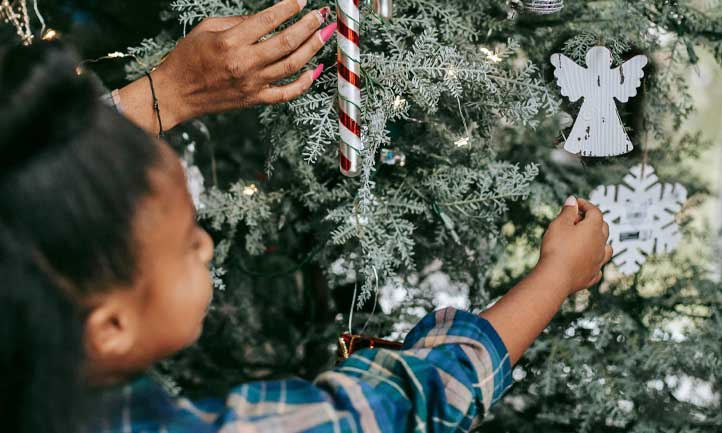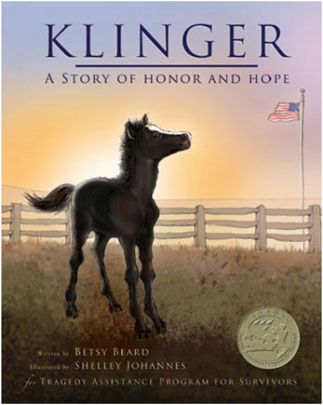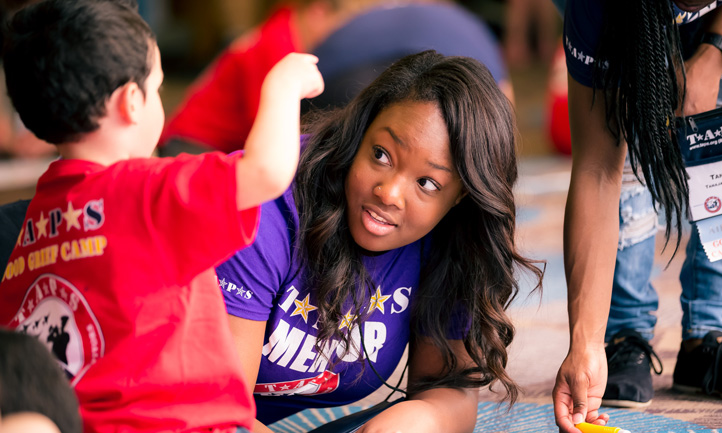Klinger's Korner: A Season for Presence
Author: Andy McNiel
The holiday season brings families and friends together, creating opportunities to make and share special memories and create or carry on traditions. But, in the midst of intense grief, the holidays can feel like a burden rather than a blessed time with family and friends. When children are in the home, you may feel the need to maintain positive, festive energy so they can still enjoy this special time of year. This is a common experience for many bereaved adults. If you find yourself at that place, please know that you are not alone and, though it might be difficult, the holiday season can still be meaningful for you and your children.
This season, instead of trying to control the “outputs,” focus on your “inputs” — what you can control. While there is nothing wrong with having expectations in life — expectations of your own behavior, your children’s behavior, and household values — some of the expectations we have may keep us from seeing what is in front of us. Often at this time of year, we set goals for ourselves; this is a focus on outputs or outcomes. We might enter the holidays anxious about whether we can make it special for our children, worried that we won’t find the strength to appear happy while carrying the heavy burden of sorrow.

5 Ideas to Help Support Your Children This Holiday Season
We all spend much of our lives focused on the burdens of the past and worrying about what comes next. We sometimes miss opportunities here in our present. But, focusing on inputs — even in the depths of grief — can ease the pressure, help you be present, and support you and your children this holiday season. Give these five ideas a try this winter.
-
Accept that sorrow will likely be a part of your holiday season.It is normal to experience the depths of our grief this time of year because it’s connected to so many special memories of those we love — or, in some cases, relationships that brought much pain. Accepting that grief is not something we can always control in the moment helps prepare us for when it comes.
-
Challenge fatalistic thoughts, like, “The holidays will never be meaningful again,” or “I cannot be happy without my person who died,” with thoughts that make room for hope. These can sound like, “The holidays will never be the same, but they can still have meaning,” or “I am grateful for my children, family, and friends this season, even though I am missing the person who died.”
-
Prioritize which holiday gatherings you will attend and which traditions you will celebrate. You do not have to accept every invitation to celebrate the season. You can decide which invitations to accept and which you will pass on this year. The holidays can still be meaningful even with less busyness. Sometimes scaling back is the best thing you can do for yourself and your children. Kids don’t need a lot of pomp and circumstance; they just need a little of our time and attention.
-
Create a new tradition that allows you to honor and remember those who have died or those unable to be with you this year. Some have found that facing reality and creating a tradition to honor your person who died can add a meaningful layer to the season. You might plant a garden, light a special candle, create a memorial display, volunteer, or do something that your person would have loved to do.
-
Plan special activities with your children during the holiday break. Our children, and many of us, have time off around the holidays. With your children, identify some special activities you can do together over the break. It could be taking a winter walk, going to look at holiday lights or displays, watching holiday movies, or cooking special meals. Remember, even if you feel disconnected from the moment, you are still in control of your choices. These suggestions on the next page can help you get started.
10 Holiday Activities for Family Time

-
Create a holiday menu together, asking each person what they want to include.
-
Bake goodies, package them in tins, and give them to neighbors or friends.
-
Invite someone who may be alone or facing their own difficult holiday season to share a holiday meal with you and your children.
-
Have each family member write down something kind they can do in honor of your special person. Put these ideas into a bowl, hang them on a tree, or attach them to a holiday display. Then, each family member selects one kind act to do in honor or in memory of your special person.
-
Make a viewing schedule for holiday movies. Be sure to include each family member’s favorite.
-
Make your special person’s favorite meal. Share the meal with family and friends while also sharing special memories of your person.
-
Go on a winter scavenger hunt. Think of items that you might encounter this time of year and see who can find the most items between you and your children. Or, look for these items as a family, and challenge yourselves to find everything on the list.
-
Come up with a family playlist. This can include holiday music or some favorite songs that may not be holiday-focused. You might also include some of your special person’s songs on this list.
-
Make a list of each family member’s favorite board game. Set aside time during the holidays to play each of these games together.
-
Prepare for 2024 by helping your children set intentions for the new year. Remember, focus on things you can control, like being kind to others, eating healthier, getting outside more, and spending quality time together as a family.

Klinger, A Story of Honor and Hope
Based on Klinger, a real horse that serves in the U.S. Army Caisson Platoon in Arlington Cemetery, Betsy Beard’s Klinger is an endearing story written for TAPS honoring all of America’s beloved fallen heroes. The children’s book illustrates a young horse dreaming of fame as a racehorse, struggling to achieve his dreams, and then finding fulfillment in honoring fallen heroes and bringing comfort to their families. A journey of loss, grief, and hope, Klinger is a wonderful and helpful book for young children experiencing grief over the death of a military loved one. Learn more about the book Klinger, A Story of Honor and Hope.

TAPS Youth Programs
TAPS Youth Programs provide safe spaces for surviving children to honor their loved one and explore their grief all while experiencing fun, adventure, mentorship, and camaraderie with peers, mentors, and caring professionals.
Visit TAPS Youth Programs to learn more and browse events, including Good Grief Camps, family campouts, and online groups and workshops.
Andy McNiel, MA, is the Senior Advisor, TAPS Youth Programs.
Photos: Pexels, Pixabay, TAPS Archives
